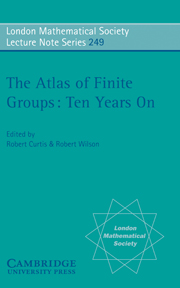Book contents
- Frontmatter
- Contents
- Introduction
- Addresses of registered participants
- Addresses of non-participating authors
- Programme of lectures
- Conference photograph and key
- Symmetric presentations and orthogonal groups
- A constructive recognition algorithm for the special linear group
- Relations in M666
- A survey of symmetric generation of sporadic simple groups
- Harish-Chandra theory, q-Schur algebras, and decomposition matrices for finite classical groups
- The Meataxe as a tool in computational group theory
- Branching rules for modular projective representations of the symmetric groups
- Characters and surfaces: a survey
- On the characterization of finite groups by characters
- Finite linear groups of small degree
- Minimal parabolic systems for the symmetric and alternating groups
- Probabilistic methods in the generation of finite simple groups
- Condensing tensor product modules
- Intersections of Sylow subgroups in finite groups
- Anatomy of the Monster: I
- An integral ‘Meat-axe’
- Finite rational matrix groups: a survey
- Chamber graphs of sporadic group geometries
- An Atlas of sporadic group representations
- Presentations of reductive Fischer groups
- A brief history of the ATLAS
Finite linear groups of small degree
Published online by Cambridge University Press: 19 May 2010
- Frontmatter
- Contents
- Introduction
- Addresses of registered participants
- Addresses of non-participating authors
- Programme of lectures
- Conference photograph and key
- Symmetric presentations and orthogonal groups
- A constructive recognition algorithm for the special linear group
- Relations in M666
- A survey of symmetric generation of sporadic simple groups
- Harish-Chandra theory, q-Schur algebras, and decomposition matrices for finite classical groups
- The Meataxe as a tool in computational group theory
- Branching rules for modular projective representations of the symmetric groups
- Characters and surfaces: a survey
- On the characterization of finite groups by characters
- Finite linear groups of small degree
- Minimal parabolic systems for the symmetric and alternating groups
- Probabilistic methods in the generation of finite simple groups
- Condensing tensor product modules
- Intersections of Sylow subgroups in finite groups
- Anatomy of the Monster: I
- An integral ‘Meat-axe’
- Finite rational matrix groups: a survey
- Chamber graphs of sporadic group geometries
- An Atlas of sporadic group representations
- Presentations of reductive Fischer groups
- A brief history of the ATLAS
Summary
Abstract
This paper is a survey of results in the study of finite subgroups of low-dimensional classical groups. The author discusses mainly his classification of the conjugacy classes and the normalizers of finite absolutely irreducible quasisimple linear groups over finite and algebraically closed fields up to degree 27.
Our aim is to discuss recent developments in the following classical problem.
Problem 1Describe the finite linear groups of small degree, i. e. finite subgroups in GLn(K) for every field K and small n.
Beginning in the middle of the last century, this problem attracted the attention of many mathematicians. By the seventies of our century it was solved for K = ℂ and n ≤ 9 in the papers by Jordan, Klein, Valentiner, Blichfeld (see [4]), Brauer [7], Lindsey [41], Huffman and Wales [16], [17], and Feit [13]. The case char K = p > 0 and n ≤ 5 of Problem 1 was considered before 1982 in the papers by Moore [44], Burnside [8], Wiman [52], Dickson [10], [11], Mitchell [43], Hartley [15], Bloom [5], Mwene [45], [46], Wagner [50], Di Martino and Wagner [12], Zalesskii [53], [54], Suprunenko [49], and Zalesskii and Suprunenko [57]. For finite K this problem stands as Problem 40 in the list of important problems of group representation theory formulated by Brauer in his lectures [6]. Results related to Problem 1 (see, for example, the surveys of Zalesskii [55], [56] and the author [26]) have found numerous applications, in particular, in the classification of finite simple groups (CFSG).
Information
- Type
- Chapter
- Information
- The Atlas of Finite Groups - Ten Years On , pp. 139 - 148Publisher: Cambridge University PressPrint publication year: 1998
Accessibility standard: Unknown
- 4
- Cited by
